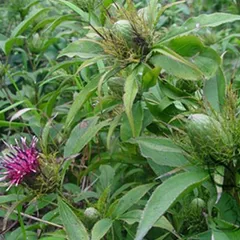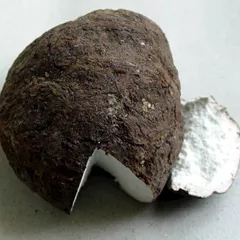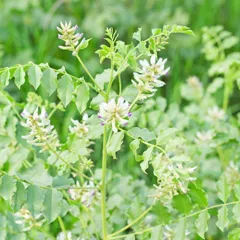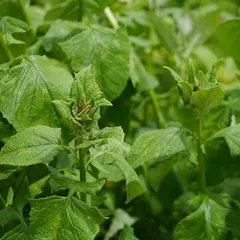Stomach and Spleen Qi Deficiency
The information provided here is not a replacement for a doctor. You shouldn't use it for the purpose of self-diagnosing or self-medicating but rather so you can have a more informed discussion with a professional TCM practitioner.
At a glance
Preliminary reading: What is a pattern? The Stomach in Chinese Medicine The Spleen in Chinese Medicine The concept of Qi The concept of Deficiency
Key attributes
Chinese name: 脾胃气虚 Pinyin name: Pí Wèi Qì Xū
Pattern nature: Empty combined pattern
Pattern(s) it combines from: Spleen Qi Deficiency Stomach Qi Deficiency
Causes
Common causes: Diet and eating habits
Diagnosis
Common symptoms: Tiredness Lassitude Weak Limbs Loose stools Poor appetite and four other symptoms
Pulse type(s): Empty (Xu)
Tongue description: Pale
Treatment
Treatment principle: Tonify Stomach and Spleen Qi
Common formulas: Si Jun Zi Tang Shen Ling Bai Zhu San Sheng Yang Yi Wei Tang and one other formulas
Pathology
It's very common for Stomach Qi Deficiency to be paired with Spleen Qi Deficiency since both Organs are so closely intertwined. The Stomach receives food and then sends the pure portion to the Spleen. Together they rule transportation of food essences.
Since they're the root of Grain Qi for the whole body, if Qi is deficient in those Organs, it ends up lacking everywhere. This is why fatigue is one of the main symptoms of this pattern.
It is also why patients feel a feeling of weakness of the limbs as the Stomach and Spleen are too weak to transport the food essences to the limbs.
The uncomfortable feeling in the epigastrium is due to Deficient Stomach Qi failing to descend. The fact it's a mere discomfort and not a feeling of pain is indicative that this is a Deficiency condition and not an Excess one.
Causes
Diet and eating habits: A diet lacking in nourishment and protein or undereating can cause a Deficiency of Spleen and Stomach Qi. Bad eating habits like having meals at irregular times, eating on the go or while working or stressed can also cause this pattern.
Diagnosing Stomach and Spleen Qi Deficiency
Diagnosing a pattern in Chinese Medicine is no easy feat and should be left to professional practitioners. In particular one has to know how to differentiate between different types of pulses and tongue coatings, shapes and colors as well as learn to read from a long list of seemingly unrelated symptoms.
Pulse type(s): Empty (Xu)
Tongue description: Pale
Main symptoms: Tiredness Lassitude Weak Limbs Loose stools Poor appetite Lack of taste Pale complexion Epigastrium discomfort Slight abdominal distension after eating
Diagnosis commentary: Poor appetite, epigastric discomfort and tiredness are enough in and of themselves to diagnose Stomach and Spleen Qi Deficiency.
Treating Stomach and Spleen Qi Deficiency
Treatment principle
Tonify Stomach and Spleen Qi
Herbal formulas used to treat Stomach and Spleen Qi Deficiency



The top herbs in Si Jun Zi Tang are Ginseng (Ren Shen), Atractylodes Rhizomes (Bai Zhu) and Poria-Cocos Mushrooms (Fu Ling)
Si Jun Zi Tang
Source date: 1107 AD
Number of ingredients: 4 herbs
Key actions: Tonifies Qi. Strengthens the Spleen and Stomach.
Formula summary
Si Jun Zi Tang is a 4-ingredient Chinese Medicine formula. Invented in 1107 AD, it belongs to the category of formulas that tonify Qi.
Besides Stomach and Spleen Qi Deficiency, Si Jun Zi Tang is also used to treat Qi Deficiency or Stomach Qi Deficiency.



The top herbs in Shen Ling Bai Zhu San are Ginseng (Ren Shen), Atractylodes Rhizomes (Bai Zhu) and Poria-Cocos Mushrooms (Fu Ling)
Shen Ling Bai Zhu San
Source date: 1107 AD
Number of ingredients: 10 herbs
Key actions: Augments the Qi. Strengthens the Spleen. Leaches out Dampness. Stops diarrhea.
Formula summary
Shen Ling Bai Zhu San is a 10-ingredient Chinese Medicine formula. Invented in 1107 AD, it belongs to the category of formulas that tonify Qi.
Besides Stomach and Spleen Qi Deficiency, Shen Ling Bai Zhu San is also used to treat Small Intestine Deficient and Cold or Stomach and Spleen Yin Deficiency.



The top herbs in Sheng Yang Yi Wei Tang are Milkvetch Roots (Huang Qi), Liquorice (Gan Cao) and Atractylodes Rhizomes (Bai Zhu)
Sheng Yang Yi Wei Tang
Source date: 1247 AD
Number of ingredients: 16 herbs
Key actions: Strengthens the Spleen. Augments the Qi. Raises the Yang. Releases Dampness.
Formula summary
Sheng Yang Yi Wei Tang is a 16-ingredient Chinese Medicine formula. Invented in 1247 AD, it belongs to the category of formulas that tonify Qi.
Besides Stomach and Spleen Qi Deficiency, Sheng Yang Yi Wei Tang is also used to treat Damp-Heat in Stomach and Spleen.



The top herbs in Xiang Sha Yang Wei Wan are Costus Roots (Mu Xiang), Atractylodes Rhizomes (Bai Zhu) and Poria-Cocos Mushrooms (Fu Ling)
Xiang Sha Yang Wei Wan
Source date: 1587 AD
Number of ingredients: 13 herbs
Key actions: Strengthens and harmonizes the Spleen and Stomach. Resolves Dampness.
Formula summary
Xiang Sha Yang Wei Wan is a 13-ingredient Chinese Medicine formula. Invented in 1587 AD, it belongs to the category of formulas that tonify Qi.
Besides Stomach and Spleen Qi Deficiency, Xiang Sha Yang Wei Wan is also used to treat Stomach Yang Deficient and Cold.
Diet recommendations
Eat only cooked foods (nothing raw). Particularly beneficial ingredients include: rice, millet, meat (especially beef), winter squash, vegetables, azuki beans, congee and warm or room temperature drinks such as warm milk.
Avoid cold, raw vegetables and fruits, juices, iced drinks, ice cream and frozen yogurt, salads, uncooked foods and the excessive use of sugar and other sweeteners.
Avoid strenuous exercise. Favor light activities such as Yoga, Tai Chi, Qi Gong, swimming, walking or bicycling.
